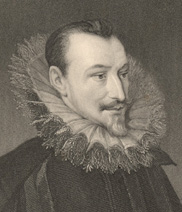Edmund Spencer
(1552 - 1599)

Spenser’s intention seems to have been to combine in his own way
the success of Ariosto with the success of Dante.
SRI AUROBINDO
from The Fairie Queene
I
A Gentle Knight was pricking on the plaine,
Y cladd in mightie armes and siluer shielde,
Wherein old dints of deepe wounds did remaine,
The cruell markes of many’ a bloudy fielde;
Yet armes till that time did he neuer wield:
His angry steede did chide his foming bitt,
As much disdayning to the curbe to yield:
Full jolly knight he seemd, and faire did sitt,
As one for knightly giusts and fierce encounters fitt.
II
But on his brest a bloudie Crosse he bore,
The deare remembrance of his dying Lord,
For whose sweete sake that glorious badge he wore,
And dead as liuing euer him ador’d:
Vpon his shield the like was also scor’d,
For soueraine hope, which in his helpe he had:
Right faithfull true he was in deede and word,
But of his cheere did seeme too solemne sad;
Yet nothing did he dread, but euer was hdrad.
Sri Aurobindo’s remarks:
«The Faerie Queene is indeed a poem of unfailing imaginative charm and it two opening cantos are exquisite in execution; a stream of liquid harmony, or curiously opulent, yet tempered description, of fluid poetical phrase and minutely seen image, — for these are Spenser’s constant gifts, the native form of his genius which displays more of descriptive vision than of the larger creative power or narrative force, — they work out an inspired idea, a little too much lost in detail and in the diffusion of a wealthy prolixity but still holding well together its rather difficult and entangling burden of symbols and forms and achieving in the end some accomplished totality of fine poetic effect. But if we look at the poem as a whole, the effect intended fails, not because it happened to be left unfinished, nor even because the power in it is not equally sustained and is too evidently running thinner and thinner as it proceeds, but because it could not have come to a successful completion.
[…] A faery-tale and an ethical symbol in one is his conception of his artistic task. That is a kind of combination difficult enough to execute, but capable of a great and beautiful effect in a master hand; it had been achieved with supreme success by Homer and Valmiki. But the Elizabethan intellectual direction runs always towards conceit and curious complication and it is unable to follow an idea for the sake of what is essential in it, but tangles it up in all sorts of turns and accessories; seizing on all manner of disparates it tends to throw the, together without any real fusion. Spenser in his idea and its execution fell a victim to all these defects of the intelligence. […] The subject of a poem of this kind has to be the struggle of the powers of good and evil, but the human figures through whom it works out to its issues, cannot be merely the good or the evil, this or that virtue or vice, but must stand for them as their expressive opportunity of life, not as their allegorical body. That is how Homer and Valmiki work out their idea. Spenser, a great poet, is not blind to this elementary condition, but his tangled skein of allegory continually hampers the sounder conception and the interpretative narration works itself through the maze of its distinctions which we are obliged to accept, not for their own interest or living force and appeal, but for the beauty of the poetic expression and description to which they give occasion.
[…] The English poet loses himself in the outward, in romantic incident and description pursued by his imagination for their own sake. His idea is often too much and too visibly expressed, yet in the end finds no successful expression. Instead of relying upon the force of his deeper poetic idea and sustain him, he depends on intellectual device and parades his machinery. The thread of connection is wandering and confused. He achieve a diffuse and richly confused perplexity, not a unity.»
